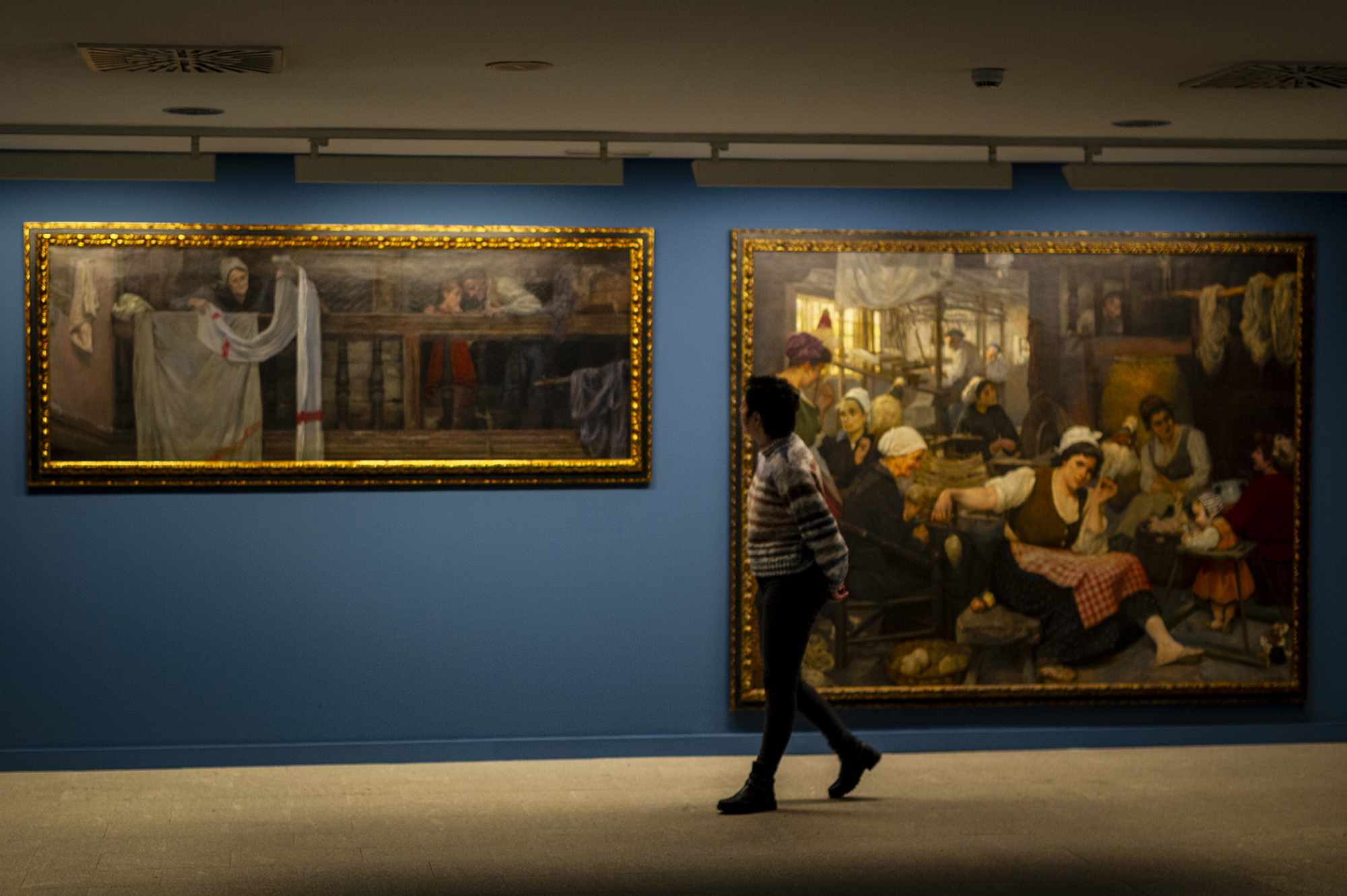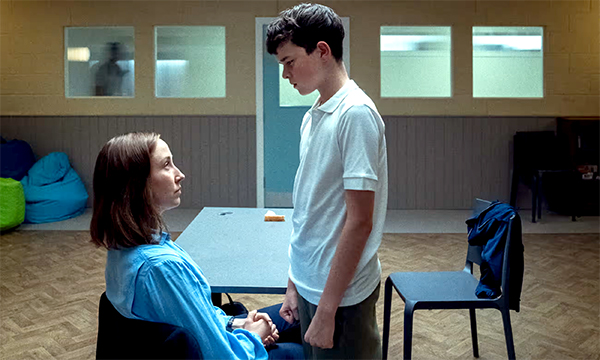"Desire has no object of its own: it is polymorphic and tends to deviate"
- Gasteiztarra writer and thinker Sara Torres offered a poetic reading two weeks ago, an interview with the public and a six-hour workshop at the Artium of Vitoria-Gasteiz, within the Trama program. Then, generously, he told me about his work on Sunday afternoon, sunny. Torres is known for his strong theoretical and academic base, which has served him to “complete” his creative activity.

Sara Torres
Xixon (Asturias, Spain, 1991)
Thinker and writer. He studied at the University of Oviedo (Asturias) and at the Queen Mary University of London. In the latter, he made his thesis combining the theory of Cuir and psychoanalysis. He has written mostly poetry, but his two novels have had a broad echo: What There Is (2022) [What There is] and Seduction (2024) [Seduction]; both published by Reservoir Books. He's now working on an essay and on a stage piece.
You’ve been publishing poetry for a long time, but in the last two years you’ve become very popular thanks to your novels. How have you lived it?
I think it's a fiction. My body has absolutely no belief that this is real, not much less stable. At the same time, it makes me feel really good, because I get new friendships, those that are already willing to love me, because they've read or heard me before, and that's a privilege. But the vision machine tends to total visibility or extinction, one of the two: every media wrestles for attention and exploits its its names as they're useful, and then discards them. Therefore, the waste of the work done during all these years has given me a great deal of vertigo, because that visibility has been seen as invading, or because at one point I have had too much visibility.
Have you taken any action?On the one
hand, I did not participate in the proposals related to the impact, and then I talked to the publisher to agree on the streaks of disappearance. We have made a great promotion with Seduction and now it is necessary not to be or be otherwise, only in nearby places. Where I've always been.
Psychoanalysis weighs heavily on your propuestas.EmpecI read psychoanalysis at the age of
16-17, and then I put it back on the master’s, at King’s College London, through a professor: Hector Kollias. I brought the authors who have questioned psychoanalysis, and so I met Teresa of Lauretis and Bollero psychoanalysis. They made sense to me.
Heterosexuality is considered the highest topic of humanity and wanted to get out of it. Psychoanalysis teaches us that desire has no object of its own, is perverse and polymorphic, which is sometimes forgotten by the more patriarchal stream of psychoanalysis. It is then educated, oriented towards concrete social and cultural objectives, but desire is inherent to deviation and polymorality. And this principle seems to me to be an absolute ally to Cuirist studies.
I'm interested in psychoanalysis from the point of view of thought. I don't know if I believe in psychoanalytic clinic, I don't know if I believe in the divan, I don't know if I believe in the distance between bodies. I am not a follower of anything, nor a representative of anything, so I must not give explanations, I owe nothing to anyone. For example, now I don't work in college anymore, and I feel a huge pleasure because I'm not a representative of anybody and I'm free, as an artist and as a thinker, to make a mistake, to confuse myself. I can twist to find other ways, without causing disappointment to anyone above me. And that's what I like.
I would say that the wager on non-binarism crosses all of you trabajo.El binary system is an information processing system and we constantly use it in meaningful creation processes; it is understandable, since they have introduced us from a young age, we are given
that tool to think. So we turned to that opposite thought. I think Brigitte Vasallo said that this attitude of confrontation is what's available in all public conversations. Instead, I think that if something is reversed is that the opposite thought, that of confrontation, is not a tool or sophisticated or pretty to work the dimension of the real, and that we are not going to solve any problem by supporting or rejecting things, let alone in our culture, where information is disseminated quickly, and asked to show up for or against even before it is able to understand what is happening.
What should we look for?
We have to think together what other positions we can take to further develop critical thinking but not be the opposite. How to seek critical, non-oppositional and tender thinking, that is, a thought that appeals to protect the bodies involved in dialogue so that bodies dare to engage in dialogue, because otherwise they are the only ones involved in dialogue or that bodies with kamikaze or privilege and that know they can enter the struggle, because they are protected by an entire structure. But other bodies are in a kind of imbalance, we can fall into the pond at any time. So, how to make these bodies also able to participate and make mistakes and, above all, how to get the bodies to remain open, rather than being rooted in their own position, so that participation in dialogue can transform us.
It's understandable that some bodies get on the defensive, right?
The defensive trend tells us about the knowledge of the body: the body has often felt at risk and an automatic reaction has occurred, but it is not always useful. This doesn't mean that the body is wrong, that the body knows what it knows, and over and over again tries to get out of what's out there. But before that there is a privilege: it is not given, but among all of us we can work and offer others. In fact, we can create contexts of tenderness so that the body that enters the defensive can release tension. Some bodies have been constantly discussing, harmed or insulted, and we have been burned, not so sweet. There, we members can do an important job, and that is to create contexts where we tell the other: “Matte, we’re fine here, low, nothing happens.” We must say so and, at the same time, we recognise the right to come to the defensive: we must not hide the sad passions. You can come with your outrage, your jealousy or your restlessness, that has room here, but among all of us we will see if guiding you through that passion for dialogue helps you in your search. And when it's no longer worth you, then it reorganizes.
At the Saturday conference, you said: “I don’t eat the system, I take my eyes off it.” I was
talking about the heterosexual system. In other systems it would be more complex.
Yes. [Monique] I thought of Wittig.
Of course. Wittig, to me, is everything. A key starting point. All I can say is the study of the things you have already proposed. It is very important to me to show that it can go by not wanting power. Within a system that places power in certain bodies, it can happen that that idea doesn't cause you any flash. You may see that power and your eyes turn elsewhere by themselves, because that desire does not reach you. Political resistance consists in showing this disinterest and, above all, in breaking this other heterosexual myth once and for all, that is, non-heterosexual bodies tend elsewhere because of the inability to adapt.
If so, it's not. The
heterosexual system wants to create a fantasy in which lesbians resign politically, but I don't give up politically. I do not feel any attraction for the proposal of the heterosexual system; zero. I'm not interested. It doesn't seduce me, day or night. And if I ever feel angry about that system, it's because it explodes my lovers, because it spends them, because it kills them. What do you do with my friends? This system causes bodies to consider sexuality as something dangerous, that my friends come to sexuality with trauma. That brings me a terrible pity.
I have a gigantic mourning because many of our sexualities have been marked with things that you will never forget, and in the case of those who have not experienced it, it has marked the ghost of harm. And every time a testimony comes out about violence, the bodies of many of my friends remember things from the past, they can't forget them, they get traumatized again. That's what has ignited the fire in me. But beyond that, my gaze goes somewhere else, and there we are a few, doing things together. And that creates a force, an anchor force that attracts others.
Believe in a cheerful, strategic and informed present.
I believe in undertaking in the present and in alliances, in alliances by affinity. The power of affinity is infinite, because it's joyful, it's built in the affirmation. We're doing a lot of things, transforming a lot of things. Feminism is a radical paradigm shift. It is a revolution in all fields of knowledge. I think we have to celebrate it, we have to confirm abundance, power and proposals. And, of course, we must always keep the critical spirit, both inwards and outwards. Never forgetting this. Because feminism is not a political party, not a football team. It's a cultural and scientific revolution.
Your proposal is very vitalistic: to create, to add.
Wittig has something terrible: in his work, aggressiveness has room, bodies can be reconciled with their will to destroy. Bodies can say: I don't want to dedicate myself to this at all. I need this to ignite and remake. In this sense, creativity can be a way for flowers to grow, and it's not about burning the land so it's burned; we're already taking the fertilizer by our side, taking things away, we're sowing things. It is not smoking for smoking, but only if it is necessary for the fertility of the future. If you don't want to do anything but smoke, don't leave; if you don't have anything to offer, you may not go.
We've mentioned the Cuir theory and psychoanalysis, but you're also related to another line of thought: Tibetan Buddhism. In fact, you work with the Casa Virupa community of Catalonia and with Lama Norburu. I am very interested to talk to the community
of Casa Virupa and Lama Norburu, among other things because they have managed to maintain a project of community coexistence. Here we all talk about friendship at a very abstract level, or the one-year experience on the student floor. So for me, it's very important that some communities can tell what it means to live together, and it's very important to listen, to listen without judgment, to the desire to learn, although maybe you could do things differently. If I had to build a Casa Virupa, I would not have the tools to do so, and in this case, the instruments come from a non-Western tradition, from a knowledge and forms that we do not have.
What do you do now?
I am preparing an essay related to the conceptual apparatus of the thesis, but I want to take it out of the academic framework: of inaccessibility, citations and bibliography. I want to find a form of writing that is legible without first knowing a specific bibliography. I'm running tests in search of that writing. The essay itself has to do with the research of the doctoral thesis — desire, fantasy, fetish — but it has received the great influence of Anne Dufourmantelle. Exactly what Dufourmantell pondera: sweetness. As a term, it can reverse philosophical thinking.
You're also working on another project, aren't you? At the Conde
Duque Theatre, I will propose some ideas about sweetness, in dialogue with Dufourmantell's text, but through dance and theater. I will work with two other artists, Karelis [Zambrano] and Carmen [Rojas], who will be on the stage. We will work together. I'm looking forward to not being in the middle for a season. I'm so grateful that people give me spaces, but right now I think I've been too much in the middle, and it's my turn to place myself on one side to put other people in the center.
Finally, a little bit of poetry. In the first poem of The Ritual of the Unfold, [The Ritual of the Bath] returns an old saying in Spanish: “Always going to the source, the bitch breaks.” You turn it around like this: “But before breaking, it was filled several times.”
Yes, what happens is that our search, our desire, leaves us exhausted. For me, having to always go to the source indicates that the appetizing being is looking all the time because its need is renewed every day; hunger is renewed every day and you have to eat and it is very exhausting. Sometimes, in this fatigue, a negative view of life is imposed. I'll break. But every time I fill up before I break, what? How can I talk about it? When we are exhausted, in the fall of desire, in the void, remember who we were when we were filled. Because we're also able to do that.
Irungo Landetxa auzoko pala txapelketa mistoan, hogei bikotetik bakarra da emakumeek osatua, 40 lagunetik bi baino ez dira emakumeak: Idoia Karrera eta Loiola Zuazu. Lehiaz, txapelketa misto eta ez mistoen arteko aldeez eta joko-mailaz mintzatu gara haiekin. "Emakumeok... [+]
Aspaldi pertsona oso zatar bat ezagutu nuen, urrun izatea komeni den pertsona horietako bat. Bere genero bereko pertsonengana zuzentzeko, gizonezkoengana, “bro” hitza erabili ohi zuen. Edozein zapaltzeko prest zegoen, bere helburuak lortzeko. Garai hartatik hitz... [+]
La bajona kolektibo kide Heiko Elbirak salatu du psikiatriak zisheteroarautik aldentzen diren erotikak kontrolatu nahi dituela.
Prentsaurrekoa eskaini dute ostegun honetan Marc Aillet Baionako apezpikuak, elizbarrutiko hezkuntza katolikoko zuzendari Vincent Destaisek eta Betharramgo biktimen entzuteko egiturako partaideetarikoa den Laurent Bacho apaizak. Hitza hartzera zihoazela, momentua moztu die... [+]
Antifaxismoari buruz idatzi nahiko nuke, hori baita aurten mugimendu feministaren gaia. Alabaina, eskratxea egin diote Martxoaren 8ko bezperan euskal kazetari antifaxista eta profeminista bati.
Gizonak bere lehenengo liburua aurkeztu du Madrilen bi kazetari ospetsuk... [+]
11 adin txikikori sexu erasoak egiteagatik 85 urteko kartzela zigorra galdegin du Gipuzkoako fiskaltzak. Astelehenean hasi da epaiketa eta gutxienez martxoaren 21era arte luzatuko da.
























